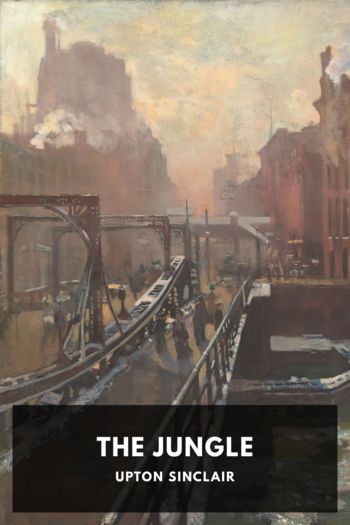Arrowsmith by Sinclair Lewis (learn to read books txt) 📕

- Author: Sinclair Lewis
Book online «Arrowsmith by Sinclair Lewis (learn to read books txt) 📕». Author Sinclair Lewis
He raised his head from the microscope, rubbed his tired eyes, reflectively rubbed his neck—his blouse was off, his collar on the floor, his shirt open at the throat. He considered:
“Something funny here. This culture was growing all right, and now it’s committed suicide. Never heard of bugs doing that before. I’ve hit something! What caused it? Some chemical change? Something organic?”
Now in Martin Arrowsmith there were no decorative heroisms, no genius for amours, no exotic wit, no edifyingly borne misfortunes. He presented neither picturesque elegance nor a moral message. He was full of hasty faults and of perverse honesty; a young man often unkindly, often impolite. But he had one gift: curiosity whereby he saw nothing as ordinary. Had he been an acceptable hero, like Major Rippleton Holabird, he would have chucked the contents of the flask into the sink, avowed with pretty modesty, “Silly! I’ve made some error!” and gone his ways. But Martin, being Martin, walked prosaically up and down his laboratory, snarling. “Now there was some cause for that, and I’m going to find out what it was.”
He did have one romantic notion: he would telephone to Leora and tell her that splendor was happening, and she wasn’t to worry about him. He fumbled down the corridor, lighting matches, trying to find electric switches.
At night all halls are haunted. Even in the smirkingly new McGurk Building there had been a bookkeeper who committed suicide. As Martin groped he was shakily conscious of feet padding behind him, of shapes which leered from doorways and insolently vanished, of ancient bodiless horrors, and when he found the switch he rejoiced in the blessing and security of sudden light that recreated the world.
At the Institute telephone switchboard he plugged in wherever it seemed reasonable. Once he thought he was talking to Leora, but it proved to be a voice, sexless and intolerant, which said “Number pleeeeeze” with a taut alertness impossible to anyone so indolent as Leora. Once it was a voice which slobbered, “Is this Sarah?” then, “I don’t want you! Ring off, will yuh!” Once a girl pleaded, “Honestly, Billy, I did try to get there but the boss came in at five and he said—”
As for the rest it was only a blurring; the sound of seven million people hungry for sleep or love or money.
He observed, “Oh, rats, I guess Lee’ll have gone to bed by now,” and felt his way back to the laboratory.
A detective, hunting the murderer of bacteria, he stood with his head back, scratching his chin, scratching his memory for like cases of microorganisms committing suicide or being slain without perceptible cause. He rushed upstairs to the library, consulted the American and English authorities and, laboriously, the French and German. He found nothing.
He worried lest there might, somehow, have been no living staphylococci in the pus which he had used for seeding the broth—none there to die. At a hectic run, not stopping for lights, bumping corners and sliding on the too-perfect tile floor, he skidded down the stairs and galloped through the corridors to his room. He found the remains of the original pus, made a smear on a glass slide, and stained it with gentian-violet, nervously dribbling out one drop of the gorgeous dye. He sprang to the microscope. As he bent over the brass tube and focused the objective, into the gray-lavender circular field of vision rose to existence the grape-like clusters of staphylococcus germs, purple dots against the blank plane.
“Staph in it, all right!” he shouted.
Then he forgot Leora, war, night, weariness, success, everything, as he charged into preparations for an experiment, his first great experiment. He paced furiously, rather dizzy. He shook himself into calmness and settled down at a table, among rings and spirals of cigarette smoke, to list on small sheets of paper all the possible causes of suicide in the bacteria—all the questions he had to answer and the experiments which should answer them.
It might be that alkali in an improperly cleaned flask had caused the clearing of the culture. It might be some anti-staph substance existing in the pus, or something liberated by the staphylococci themselves. It might be some peculiarity of this particular broth.
Each of these had to be tested.
He pried open the door of the glass-storeroom, shattering the lock. He took new flasks, cleaned them, plugged them with cotton, and placed them in the hot-air oven to sterilize. He found other batches of broth—as a matter of fact he stole them, from Gottlieb’s private and highly sacred supply in the icebox. He filtered some of the clarified culture through a sterile porcelain filter, and added it to his regular staphylococcus strains.
And, perhaps most important of all, he discovered that he was out of cigarettes.
Incredulously he slapped each of his pockets, and went the round and slapped them all over again. He looked into his discarded military blouse; had a cheering idea about having seen cigarettes in a drawer; did not find them; and brazenly marched into the room where hung the aprons and jackets of the technicians. Furiously he pilfered pockets, and found a dozen beautiful cigarettes in a wrinkled and flattened paper case.
To test each of the four possible causes of the flask’s clearing he prepared and seeded with bacteria a series of flasks under varying conditions, and set them away in the incubator at body temperature. Till the last flask was put away, his hand was steady, his worn face calm. He was above all nervousness, free from all uncertainty, a professional going about his business.
By this time it was six o’clock





Comments (0)